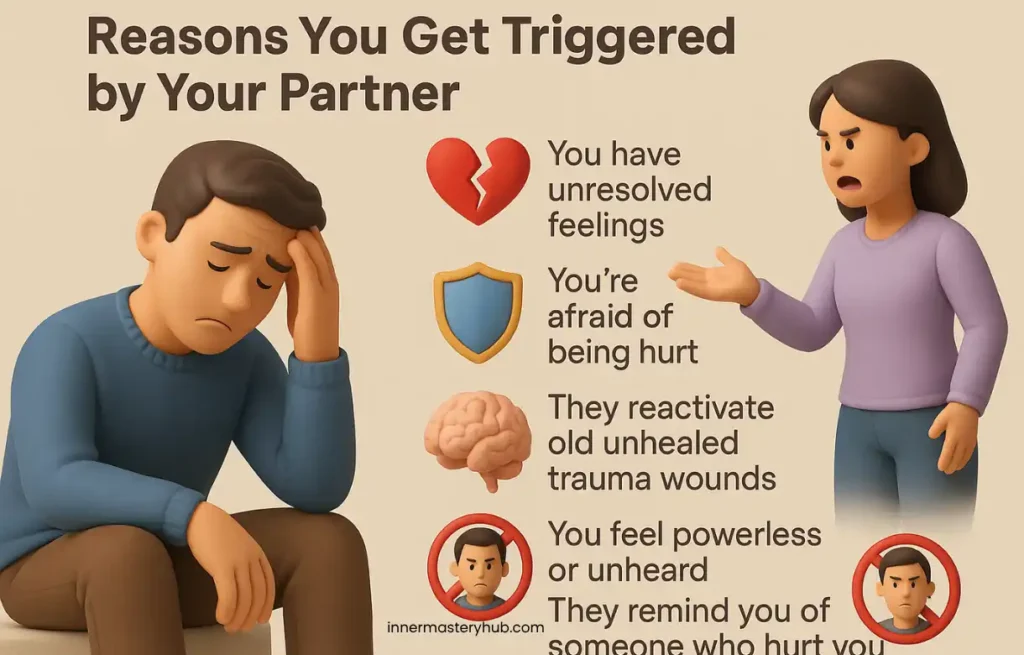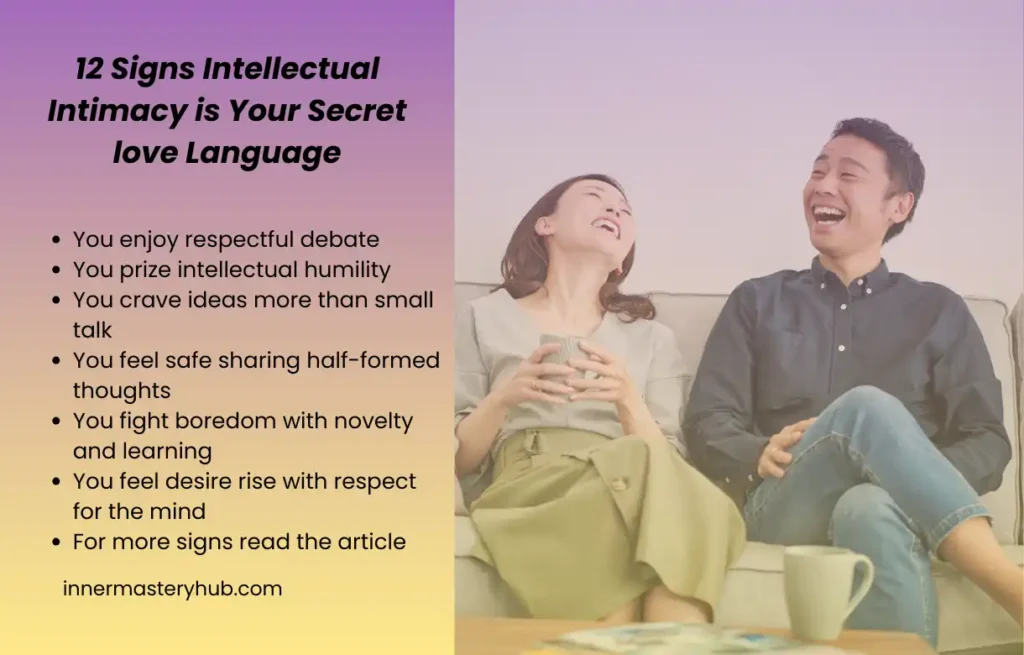12 Little-Known Reasons You Get Triggered by Your Partner

Why Your Partner Sets Off Your Emotions, it’s as though all logic flees when your partner triggers you. You can go from being composed to defensive, annoyed, or hurt in an instant. You can’t stop it, but you know your response feels more significant than the circumstances warrant.
Everyone has experienced that. Because our intimate partners reflect our deepest, most wounded parts, emotional triggers can appear even in good relationships.
This post will explain the triggers and underlying causes of your reactions, and how to shift the pattern with practical, evidence-based techniques.
When Love Meets Old Pain
It is not a sign of brokenness or drama to be triggered by your partner. It indicates that your mind and body are reacting to a perceived threat, which may not always be from the emotional past but rather from the present.
When you get triggered by your partner, you experience:
- Sudden anger, defensiveness, or withdrawal.
- Feeling misunderstood or unseen.
- Racing thoughts or physical sensations like tightness, heat, or panic.
- A desire to fight, flee, or shut down completely.
These responses sometimes appear out of proportion to the actual incident. A forgotten task, a harsh tone, or a missed text shouldn’t seem like betrayal, but occasionally it does. What happened isn’t the issue; it’s what it means to you.
Unresolved memories of past trauma are emotional triggers. Your nervous system responds as though history is being repeated when your spouse unintentionally touches those wounds.
These habits can lead to resentment, ongoing conflict, and emotional estrangement if left unaddressed. Your partner starts to feel attacked or powerless, and you begin to feel ignored.
The cycle is that. However, let’s examine what keeps you stuck in it before figuring out how to get out.
The Real Reasons You Get Triggered by Your Partner
1. They Remind You of Someone Who Hurt You
Your partner may unintentionally reflect a painful character from your history, such as a parent, sibling, ex, or authoritative figure. Their criticism, emotional detachment, or tone of speech may mirror that person’s actions.
Your mind does not distinguish between “now” and “then.” It responds as if you’re back in the original circumstance. Emotional transference is the process of reliving past traumas in present relationships.
For instance, your body immediately relives the same feeling of rejection if your partner occasionally withdraws, and your parents were erratic or dismissive.
2. You Have Unresolved Feelings About Someone Else
You may still have lingering feelings of resentment, regret, or longing even after you’ve “moved on” from an ex or an old friend. Those suppressed emotions come flooding back when your partner behaves similarly.
Your companion hasn’t done anything particularly wrong; instead, they’ve sparked an unresolved emotion within you.
3. You’re Afraid of Being Hurt, Rejected, or Misunderstood
Most people secretly worry that they won’t be accepted for who they really are. Your brain interprets that fear as a threat when it is provoked.
A neutral remark could be interpreted as criticism, especially when you can easily get triggered by your partner. Space can seem like abandonment to you. Even small arguments can feel like rejection if you were raised feeling invisible or inferior.
Because you care about your mate, this worry is intense. When that link is in danger, it feels more vulnerable the closer you are.
4. They Reactivate Old Unhealed Trauma Wounds
Your neurological system stores memories of any trauma you may have had, no matter how minor. Your body may be reliving that stored terror when your spouse triggers you.
It can have been times of helplessness as a youngster, ongoing criticism, or emotional neglect. Now, it seems like danger all over again when your partner ignores you, raises their voice, or forgets something important, when you get triggered by your partner.
For this reason, body awareness and modulation are emphasised in trauma therapy. You must feel and soothe your way through triggers; you cannot rationalise your way out of them.
5. You Carry Resentment Toward Them
Sometimes your reaction is less about the past and more about built-up frustration. Maybe you’ve felt unheard, unsupported, or underappreciated for a long time.
Even little things become huge when hatred builds up. It feels like evidence of all you’ve been suppressing when you see a firm tone, an unfinished task, or a forgotten chore.
Resentment reduces empathy and patience over time, much like emotional rust. In the absence of resolution, each new dispute builds upon the previous ones.
6. You Struggle to Accept How Different They Are From You
Difference is one powerful trigger source. While your partner wants distance, you may desire emotional intimacy. While they demonstrate love by what they do, you might yearn for words.
Your mind interprets those distinctions as disapproval or rejection when you are unable to accept them. Frequently, though, it’s just a different personality type or love language.
You can develop emotional flexibility and peace by learning to accept differences rather than struggling against them.
Your partner’s actions can occasionally disclose emotional scars you were unaware of. Perhaps the insecurity triggered by your partner stems from a lack of confidence. Possibly their silence makes you feel lonely.
“Why does this bother me so much?” you ask yourself. That discomfort reveals a part of you that seeks healing.
In this way, triggers can be teachers. They point you toward emotional areas that need compassion and attention.
8. You Expect Them to Meet Old Emotional Needs
If you didn’t feel safe, loved, or validated growing up, you might subconsciously expect your partner to fix that for you.
However, no spouse can satisfy every unfulfilled need you had as a child. Deep anguish or rage can appear when you get triggered by your partner or when they unavoidably fall short.
Knowing which wants are from the past and which are part of the current relationship is a necessary part of healing.
9. You’re Tired, Stressed, or Emotionally Depleted
Your emotional threshold is lowered when you’re tired. You feel overwhelmed by even minor stressors when you’re exhausted.
This is why self-care, diet, and sleep are more important than you may believe for both emotional control and overall health.
10. You feel ignored or helpless
When your voice is not valued, triggers increase. Every little dismissal triggers a reaction in you because it strengthens your sense of helplessness. Both parties must feel equal, heard, and respected for their relationship to be healthy. Without it, there is an emotional tug-of-war in the relationship, with one partner vying for power and the other for approval.
11. Your Partner’s Behavior Conflicts With Your Core Values
Sometimes honesty, rather than trauma, is the trigger. Emotional conflict arises when your partner’s decisions go against your ideals of kindness, honesty, and respect.
This type of trigger suggests you may need more precise boundaries or that you are compromising too much.
12. You no longer consider them to be human.
After some time together, it’s simple to view your partner as a role model (“my husband,” “my girlfriend”) rather than as a human being with their own anxieties and fears. Their mistakes seem overwhelming when you’re expecting perfection. The edge of reactivity gets reduced when you keep in mind that they are human, just like you.

The Cost of Staying Stuck in Triggers
One of the best indicators of relationship frustration, according to research from the Gottman Institute, is unresolved emotional triggers. Continuously becoming defensive, critical, or withdrawing can cause emotional distance in a couple that might take years to heal.
Regularly getting triggered by your partner can affect your health as well. Long-term relationship stress has been linked to elevated cortisol, weakened immunity, and increased anxiety and depression, according to studies.
However, the real tragedy is emotional: love, curiosity, and empathy become less available the longer you remain trapped in reaction.
Healing the Trigger Cycle
The good news? Triggers aren’t destiny. They’re messages. When you respond with awareness instead of reactivity, you can turn conflict into connection.
Here’s how.
1. Notice and Name What’s Happening
The first step is awareness. The moment you feel that rush of emotion, pause. Take a breath. Name it internally: “I’m feeling triggered right now.”
Labeling emotions reduces their intensity. Neuroscientist Dan Siegel calls this “name it to tame it.”
Ask yourself:
- What am I feeling (hurt, fear, shame)?
- What story am I telling myself about this?
- Does that story belong to now or my past?
2. Pause Before Responding when being triggered by your partner
You don’t have to react instantly. It’s okay to say, “I need a moment to think about this,” or “Can we come back to this later?”
Taking a break gives your nervous system time to calm down. Once you’re regulated, you can return to the conversation with clarity instead of anger.
3. Communicate Vulnerably Instead of Defensively
When speaking, put more emphasis on your needs and feelings than on casting blame.
Say: “I felt forgotten and hurt when you didn’t text back.”
Not: “You don’t give a damn about me.”
This shift from accusation to vulnerability opens the way for comprehension rather than intensification.
4. Practice Self-Regulation
Learn techniques that calm your body when you feel flooded:
- Deep belly breathing.
- Grounding (noticing your feet on the floor).
- Progressive muscle relaxation.
- Journaling or stepping outside briefly.
Your ability to regulate yourself is more powerful than any argument.
5. Explore Your Triggers Through Reflection
Keep a “trigger journal.” Each time you get triggered by your partner, jot down:
- What happened?
- How did I feel?
- What did I think it meant?
- What did it remind me of?
You will see trends over time. You may find that the majority of triggers are related to feelings of being invisible or fear of rejection.
Therapy is helpful if the patterns are severe or unpleasant. Emotional relationship triggers and healing are the focus of techniques like Internal Family Systems (IFS) and Emotionally Focused Therapy (EFT).
6. Heal Old Resentments
Resentment is a debt of the emotions. Communicate what has been upsetting you so you can pay it down before it builds up.
Employ polite openness: “I’ve been harbouring resentment over this. I no longer want it to grow.
Let go for your own mental health, not for them.
7. Create a “Rupture and Repair” Habit
Conflict is unavoidable. One can choose to repair after a disagreement and consciously reunite:
Accept accountability for your role.
Respect your partner’s perspective.
Reaffirm your affection or gratitude.
According to Dr. John Gottman’s research, couples who successfully resolve disagreements have much greater levels of long-term satisfaction.
8. Show compassion for yourself
Do not embarrass yourself when you get triggered by your partner, as self-criticism makes the pain worse.
Instead, tell yourself: “This response makes sense.” It’s an old wound that demands attention.
Treating yourself with kindness keeps you composed and less defensive towards your partner.
9. Rebuild Emotional Safety Together
Together, we can rebuild emotional safety.
In a quiet moment, discuss your triggers with your partner. One could say:
You remind me of my past, so sometimes I shut down when you raise your voice. I want you to understand; I’m not pointing fingers at you.
This shifts triggers into opportunities for closeness rather than loneliness.
10. Replenish Your Emotional Energy
Self-care, connection, and rest are fundamental for building emotional resilience; they are not extravagances. Triggers cannot be controlled while you are drained.
Get enough sleep, eat healthily, exercise, hang out with friends who encourage you, and engage in joyful activities.
11. Appreciate the Trigger as a Teacher
Each time you get triggered by your partner, ask:
- What is this moment trying to teach me?
- What part of me needs compassion or healing?
- How can I respond differently next time?
The trigger becomes not a threat, but a guide that shows you where growth is possible.
Self-Reflection Prompts
- When was the last time you felt deeply triggered by your partner?
- What did their behavior remind you of?
- What emotion came up strongest: anger, fear, sadness, or shame?
- What belief about yourself or love did it reinforce?
- How could you meet that need within yourself before asking them to?
- What would a calm, compassionate response look like next time?
Regularly write these answers to help you track your emotional growth.
The Science Behind: You get triggered by your partner
There are now convincing theories in modern psychology for why your partner triggers you and why those reactions seem so strong.
According to attachment theory, your adult experiences of intimacy, love, and safety are influenced by the bonds you formed with your carers during your early years. That past emotional cycle is unconsciously relived when your partner acts in ways that reflect those early dynamics, such as by ignoring, criticising, or retreating. The response seems more significant than the actual situation.
From a neurobiological perspective, triggers also make sense. Before the logical part of your brain can comprehend what is actually happening, the amygdala, the brain’s natural threat detector, takes action. This implies that even if your partner didn’t plan to hurt you, you could suddenly feel distressed, frustrated, or defensive. Your nervous system is saying, “This feels dangerous,” before your mind has time to evaluate the facts.
Another level of understanding is added by mindfulness research. According to research, practicing awareness, whether through breathing, grounding, or naming your feelings, activates the brain regions responsible for calm and regulation. Learn to gradually rewire your stress response through mindfulness to help yourself avoid reliving past trauma.
Lastly, relationship studies, especially those conducted by Dr. John Gottman, show that couples who can resolve disagreements peacefully and consistently show empathy for one another develop stronger, more durable relationships. The ability to recognise triggers, relax, and re-establish a connection is what genuinely keeps a relationship going, not the lack of them.
Making peace when you get triggered by your partner
Your spouse triggers you not because you’re flawed but instead because love and companionship bring out the best in you. Those feelings are messengers, not enemies.
They indicate the places where your needs were previously ignored, where your heart still aches, and where you wish healing to take place.
You can disrupt old cycles by pausing, breathing, and responding with awareness instead of defence. You go from conflict to connection, from fear to understanding.
If you use it properly, being triggered by your partner can really strengthen love. Because you’re not only mending the relationship when you confront a trigger with compassion and honesty. You’re getting better.
FAQs About Reasons You Get Triggered by Your Partner
Why do you get triggered by your partner for small things?
Even seemingly insignificant things, like a forgotten note, a witty remark, or a specific tone, can cause you to overreact. These little moments feel so huge because they trigger deeper emotional scars from your history. Your nervous system links your partner’s actions to past experiences of fear, neglect, or rejection. Even if everything is safe right now, your body reacts as if it were in danger.
Are emotional triggers always about past trauma?
Many triggers are connected with unresolved emotional suffering, but not all are linked to severe trauma. Unresolved relationships, childhood experiences, and attachment traumas are a few examples. However, there are instances when being anxious, worn out, or mentally exhausted might act as a trigger. It’s not always about the past; sometimes, it’s just about your ability to handle things right now.
How can you tell when you are triggered by your partner versus just upset?
The sense of being provoked differs from that of being usually upset. Your reaction when you’re triggered by your partner is strong and seems out of proportion to the situation. Your heart may race, you may feel overwhelmed with emotion, or you may feel like snapping or disconnecting. It is a quick, uncontrollable, and automatic reaction. You can typically remain in the moment and consider your options while you’re just upset.
What is the first thing you should do when you feel triggered by your partner?
The first thing to do is to wait before responding. Breathe deeply and accept what’s going on inside of you. You may even tell yourself, “Why are you being triggered by your partner right now?” After that, concentrate on relaxing your body by taking deep breaths, feeling your feet on the ground, or, if necessary, taking a brief break. Once you’re grounded, you’ll be able to respond from awareness instead of emotion.
How can I talk to my partner about my triggers without blaming them?
Instead of blaming others, focus on your own experience. Use “I” statements, such as “I feel hurt and afraid when you leave me during a disagreement because it reminds me of being ignored in the past.” This method keeps your partner from feeling attacked while helping them understand what is going on. Allow people into your inner world without blaming.
Can therapy really help with emotional triggers?
Indeed. One of the best methods to identify and address emotional triggers is through therapy. Emotionally Focused Therapy (EFT), Internal Family Systems (IFS), and EMDR are some of the modalities that can help you better understand the causes of your reactions and improve your emotional control. A professional therapist gives you the resources, understanding, and encouragement you need to avoid handling things alone.
Do both partners need to work on their triggers for the relationship to improve?
Yes, ideally. You build a stronger basis for connection when you both identify and control your triggers. The relationship can still get better, though, even if only one person starts the effort. Your partner’s nervous system reflects your increased self-awareness and tranquilly. Naturally, repairing your side of the pattern affects the entire dynamic.
How long does it take to stop being triggered by your partner?
There is no shortcut. Resolving emotional triggers takes time and is a progressive process. Consistent self-awareness and practice will likely yield little change in a few weeks or months, but deeper wounds may take longer to heal. The objective is to identify triggers more quickly and respond with compassion rather than react, not to eliminate them.
Does mindfulness or meditation really help with triggers?
Yes. Meditation and mindfulness can teach your brain to think things through before behaving. These techniques help to quiet the stress response and strengthen the areas of your brain that control emotion. With increased awareness of your feelings — such as stress, a racing heart, and a need to protect — you can better regulate your reactions to triggers.
What if my partner resists talking about triggers or doesn’t take it seriously?
In many cases, one partner is more willing to engage in emotional labour than the other. Try bringing up the subject softly and picking a quiet time to speak if your partner objects. Please describe how you want a healthier relationship rather than placing blame on them. If they continue to avoid the topic, start by concentrating on your own development. Sometimes, one person’s self-awareness and calm presence can gradually inspire change in the relationship.






